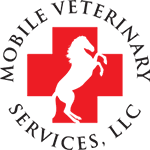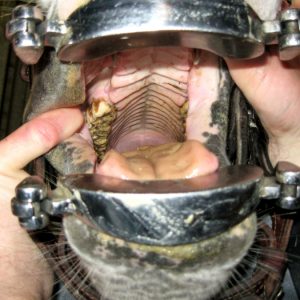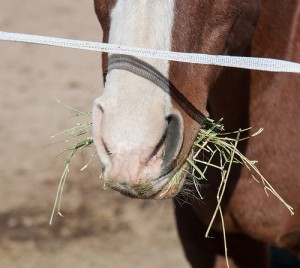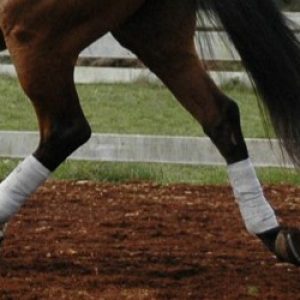At what age is a horse considered geriatric or senior? Does owning a senior horse mean that he must eat a feed labeled as a “senior” feed? As always, the answer is, it depends. Our horses are living longer lives than ever, thanks to an evolving understanding of the needs of geriatric horses and our ability to provide high quality care. There is no set age cutoff as to when a horse is considered geriatric, but most experts agree this can be around age 20. However, age is just a number, and many horses are still active and competing into their twenties, while others are happily retired. The main issues we see in our older horse population include dental disease, altered dietary needs, metabolic disease/PPID (Cushings), and arthritis.
Dental Changes
The ideal time to begin focusing on your horse’s regular preventative veterinary care is when he is young. Horses receiving regular preventative care, especially veterinary dentistry, preserve their teeth longer and can age more gracefully. Waiting until signs of dental disease or difficulty chewing are observed often indicates advanced disease and more limited treatment options. Most horses benefit from yearly dentistry, which includes a thorough sedated oral exam with a dental speculum, light source, and mirror. A thorough oral exam is vital to accurately assess, document, and treat any issues.
Horses suffering from abnormal dental wear, cracked or missing teeth, or severe periodontal disease may require more frequent care. Even though horse teeth are described as “long rooted,” they do eventually wear out, so proper care ensures the longest possible life of the tooth. Common dental issues in older horses include fracture of cheek teeth, complete expiration or wearing out of cheek teeth, loose/painful teeth, and periodontal disease. The incisors can also be affected by similar conditions.
Staying on top of your senior horse’s dental care helps ensure that he gets what is needed from his diet. Sometimes severe dental disease and impaired chewing ability necessitates eliminating hay from the diet entirely. Complete feeds are formulated specifically for horses that can no longer chew hay effectively. These diets have greatly improved the quality and length of life for senior horses with compromised teeth.
Nutrition recommendations for the geriatric horse are formulated around maintaining an ideal body condition. In the geriatric horse, this can be complicated by difficulty chewing, poor teeth, metabolic disease, and decreased ability to digest fiber and protein. For older horses in good weight and with adequate dentition, little dietary change may be required. For older horses who have difficulty maintaining weight and/or compromised teeth, complete feeds as mentioned above can help. These feeds are high in easily digestible fat, fiber, and protein, and are designed as easy-to-chew. They are formulated to replace hay entirely for those horses that can no longer adequately chew hay.
Adding water to soften the feed can reduce the risk of choke and ensure additional water intake. Feeding recommendations are often listed as pounds of feed per day depending on whether the horse is also eating hay, so it is important to weigh out your horse’s portion so that any necessary adjustments can be made more accurately.
Metabolic Changes
A curly haircoat and muscle loss over the back aren’t just signs of aging- They can indicate a common underlying condition: equine pars 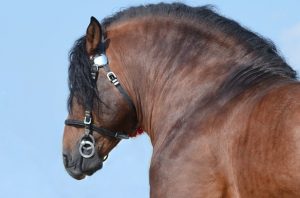 pituitary intermedia dysfunction, more commonly known as PPID or Cushings disease. This is a treatable (but not cureable) condition that is very common in geriatric horses, resulting in hormonal imbalances and symptoms such as delayed shedding, curly hair coat, muscle loss over topline, increased drinking and urinating, personality changes, and increased susceptibility to infections and laminitis. Diagnosis is made by a blood test as well as by history and clinical signs. Management involves daily administration of pergolide (Prascend) tablets, which help restore normal hormone levels and alleviate the clinical signs of the disease.
pituitary intermedia dysfunction, more commonly known as PPID or Cushings disease. This is a treatable (but not cureable) condition that is very common in geriatric horses, resulting in hormonal imbalances and symptoms such as delayed shedding, curly hair coat, muscle loss over topline, increased drinking and urinating, personality changes, and increased susceptibility to infections and laminitis. Diagnosis is made by a blood test as well as by history and clinical signs. Management involves daily administration of pergolide (Prascend) tablets, which help restore normal hormone levels and alleviate the clinical signs of the disease.
Equine Metabolic Syndrome (EMS) is a separate metabolic condition, but it sometimes occurs in conjunction with PPID. EMS horses typically show signs of being an “easy keeper”- cresty neck, regional fat deposits behind the shoulders and at the tail head. Horses with EMS are more susceptible to laminitis and usually have a higher baseline insulin level than normal. EMS horses are managed with strict attention to diet (minimizing sugar and starch) and exercise to help them maintain a lean body weight.
Joint and Muscle Changes
Just like us, aging horses suffer from daily aches and pains. An examination with your vet can help identify major and minor issues and
determine what treatment plan works best for you and your horse. Many options are available to keep our old horses comfortable.
Nutraceuticals (supplements) are very popular, although many of these products lack proof of efficacy and ingredients. More researched options include medications such as adequan (administered intramuscularly) and Legend (administered intravenously). These medications help provide the components necessary to keep joints healthy.
Joint injections target individual joints to reduce pain and inflammation and improve mobility. Non-steroidal anti-inflammatories such as Equioxx are also helpful, along with acupuncture and chiropractic care. Stable management is equally important- maximum turn out time allows horses to move at will, and monitoring herd dynamics ensures that older horses are not prevented from accessing food and water. In addition to these considerations, regular veterinary and farrier care will help your senior horse enjoy his golden years with you.
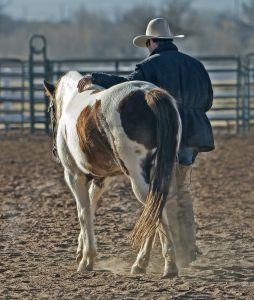 As always, if you have any questions about caring for your senior horse, please contact your veterinarian who can offer a personalized plan to help keep your geriatric horse happy, healthy, and comfortable well into their senior years.
As always, if you have any questions about caring for your senior horse, please contact your veterinarian who can offer a personalized plan to help keep your geriatric horse happy, healthy, and comfortable well into their senior years.

